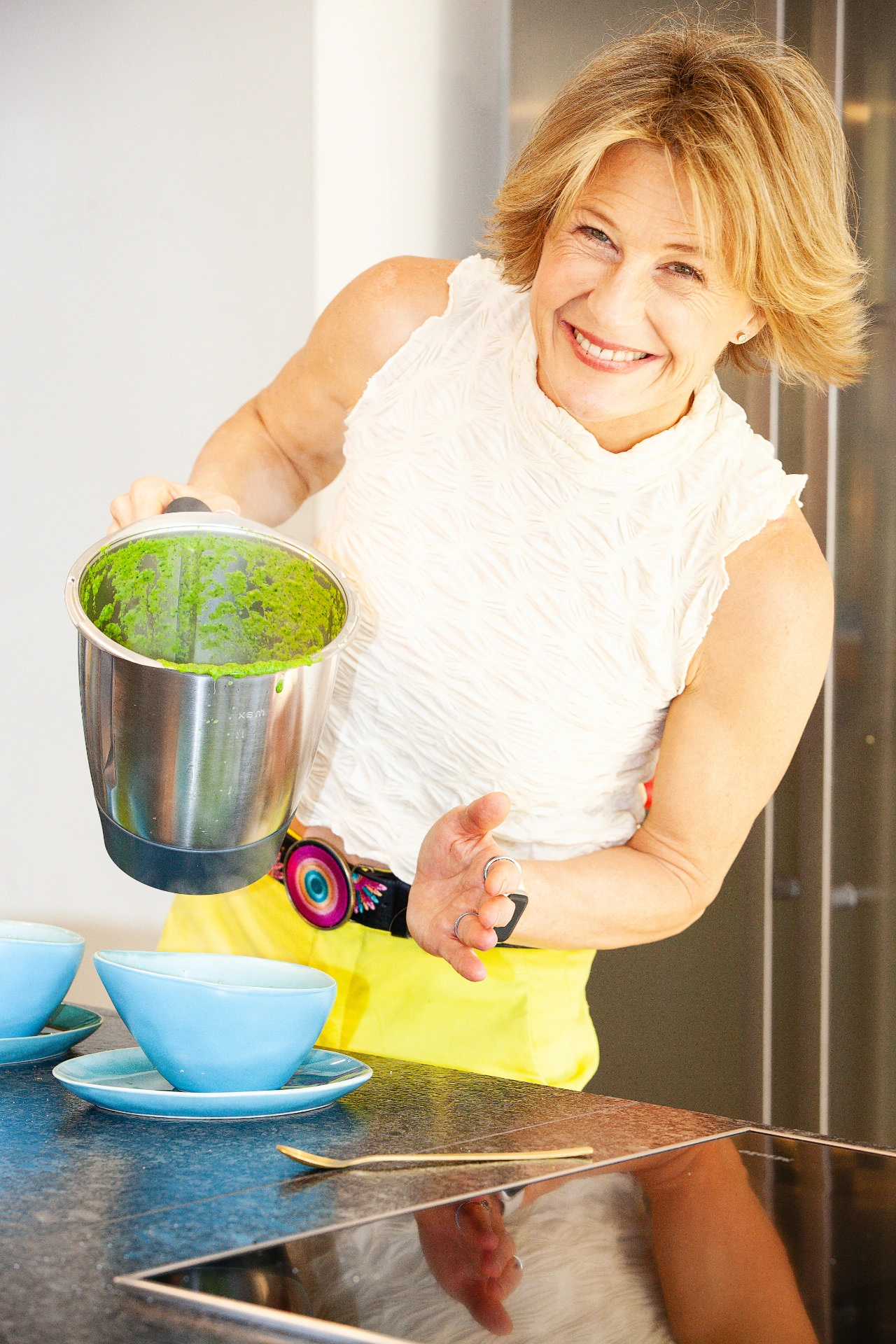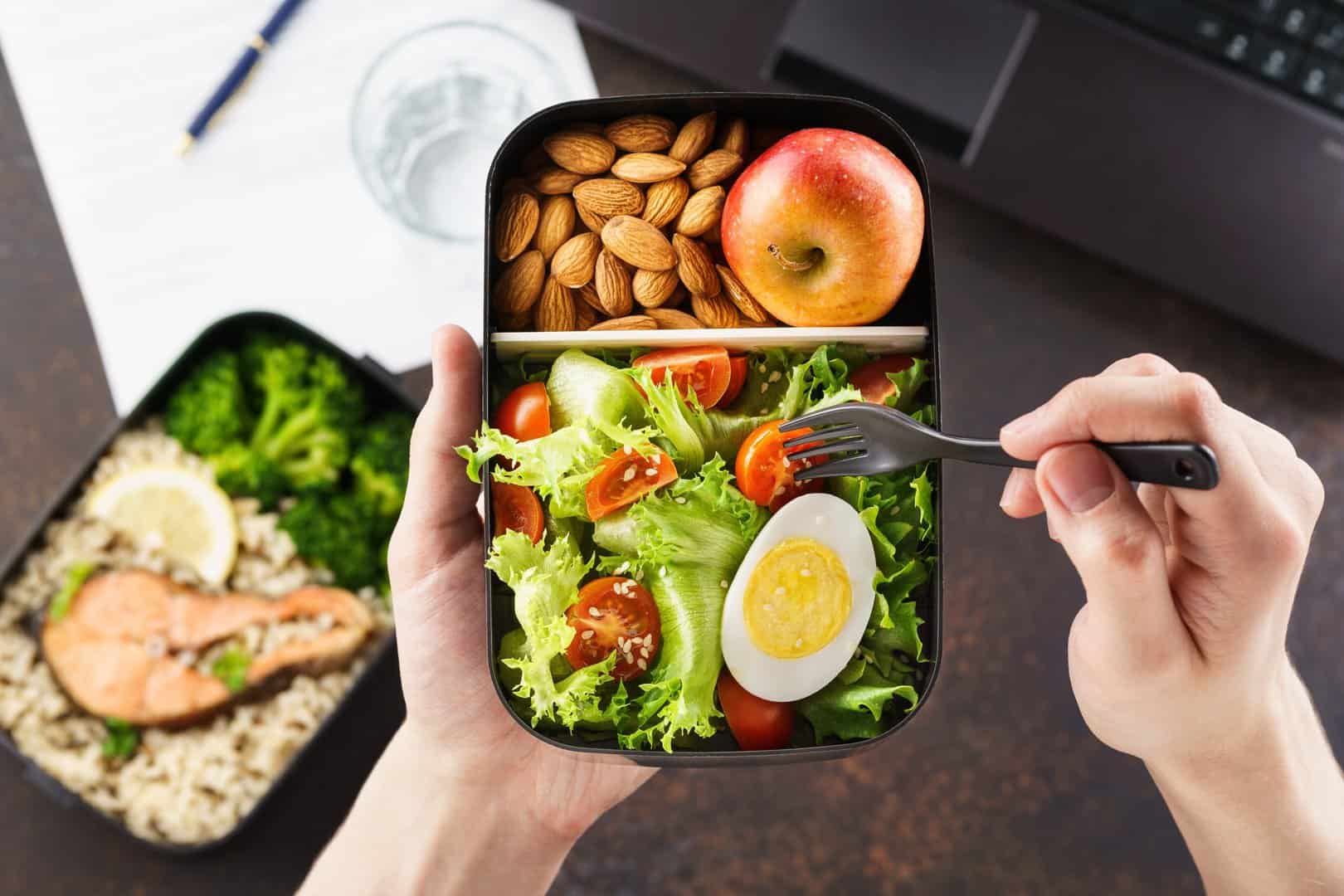
The festive season is a time for fun, celebration and socialising with your friends and family. We often enjoy incredible food and drink at this time, however, sometimes it can feel like we are using all our willpower to resist temptation at every turn!
To help you navigate this time of year, without compromise, leading Nutritionist Dominique Ludwig has put together this guide to share her valuable nutrition tips for this time of year to ensure that you enjoy the festivities with a newfound sense of FOOD FREEDOM rather than a feeling of deprivation. Life should not be about fad dieting in January, so do have some fun!
1. Eat Smarter – Not Less!
It is still possible to enjoy festive food without gaining weight or impacting your health.
It’s all about making smarter choices that make us feel energised throughout the season. Eating smarter can help to stabilise blood sugar levels so that we feel full up for longer which makes us less likely snack.
Luckily, lots of the festive food is actually really good for us! Turkey, tangerines, Brazil nuts and walnuts, Brussels sprouts, red cabbage, parsnips and dates offer a range of nutrients and can benefit our health due to their rich spectrum of vitamins and minerals.
2. Eat More Fibre – Look After Your Gut
You can still have plenty of food, but choosing higher fibre meals can be very beneficial to our health at this time of year. Fibre can fill us up as well as supporting our gut microbiome to get the best health benefits.
A portion size is around the size of a clenched fist or 80-100g.
- Try and eat half a plate of vegetables at each main meal
- Choose three different vegetables with (ideally 3 different colours for variety)
My TIPS to up the fibre
- Cut celery, peppers, kohlrabi, carrots and other vegetables into easy sticks and keep in the fridge in a tub with a lid. These make eating veggies really easy, as it is normally the prepping that stops us from eating our veggies.
- Make a smoothie the morning after from 1 apple, half an avocado, the juice from 1/2 lemon and a handful of spinach. Mix together in a blender with 200ml water. Pour over a couple of ice cubes and enjoy!
3. Understand the Buffet Landscape
Hiding in plain sight, plenty of foods that try and lure us in with their festive packaging and the promise of a quick treat. While the first bite is often delectable – an explosion of crunch, salt, unami and tart flavours all in one bite, a quick look at the label reveals these imposters are often ultra processed foods (UPF’s). While it is fine to eat some UPF’s, research has linked too many of these foods with increased weight gain and increased appetite. These foods are designed to be very addictive – so one bite is never enough.
Consuming crisps, bread, pastries, mince pies, glazed biscuits, cakes, and chocolates results in rapid sugar conversion in the body. Excess sugar not immediately utilised tends to be stored as body fat. These foods can lead to feelings of heaviness and fatigue instead of energy for dancing and partying.
4. Eat Like a Nutritionist – It’s All About Proportion
Eat like a nutritionist! When it comes to eating healthily, simply arranging your food on your plate in the right proportions will automatically help you balance your meals with the correct amount of proteins, carbohydrates, fibre, and fats. Consult any nutritionist, and they’ll begin by recommending vegetables!
Vegetables provide FIBRE, which not only fills us up but also supplies us with plenty of antioxidants to support our immune system. Starting with a plate full of colourful crudites is a great way to begin. Salads are fantastic too but steer clear of heavy pasta salads! Fibre slows down our digestion, delays gastric emptying, increases fat burning, and ensures we absorb carbohydrates and sugars from our food more SLOWLY.
Put some protein on your plate! Like fibre, protein fills us up faster and for longer, and helps keep our blood sugar levels more stable. This can reduce our appetite and craving for sugary treats. Go for chicken, salmon, prawn skewers, cheese canapes or some hummus dips.
Healthy party food options include cucumber rings with cream cheese and salmon, cocktail sticks with mini-Mozzarella balls and cherry tomatoes, or Parma ham and melon. Consider bringing your own plate to impress your host!
5. Make Healthy Food Swaps
We tend to eat differently at this time of year with more treats, desserts, festive drinks and canapes creeping into the diet. It is fine to have the odd treat, but there are some clever swaps you can make to limit the damage ~
- Swap smoked salmon blini for cucumber topped with sour cream, salmon and chives
- Swap pigs in blankets for prunes wrapped in Parma ham
- Swap creamy dips with tortilla chips for fresh vegetable crudités with home-made hummus
- Swap baked Mozzarella sticks for mini Mozzarella balls and cherry tomato skewers
- Swap popcorn chicken bites for satay chicken skewers
- Swap roasted nuts for crispy chickpeas
- Vegetables are your best friend. Not only do they contain fibre, nutrients and powerful plant compounds that support our health, but FIBRE helps to SLOW down the digestion of our food and can keep us FULL UP for longer.
Aim for 5-8 portions of vegetables a day. A portion size is around the size of your clenched fist.
6. Eat Sugary Treats AFTER and never BEFORE a meal
If your office or home is filled with lovely chocolate treats, it is so easy to grab them between meals for a quick pick-me-up, but be warned, once you start to nibble it can be hard to stop. Research shows that eating sugary foods on an empty stomach can lead to greater blood sugar spikes. A meal creates a food obstacle course in our stomach which slows down the speed that we absorb glucose into the bloodstream, so the sugary treats will have less of an impact.
7. Don’t Skip Meals
Skipping meals because we know we are going to indulge later can be a false economy and can in some cases lead to us eating MORE when we go out than we planned. Eating regular balanced meals can help us to feel nourished and keep our mood on an even keel. Start the day with a good source of protein, healthy fats and fibre with some fruit, vegetables or a small amount of seeded bread. Good choices to start the day include scrambled eggs with avocado and mushrooms, plain yogurt with milled flax and chia seeds with berries, or a bowl of porridge with grated apple and cinnamon!
When we eat sufficient protein and healthy fats (avocado, nuts and seeds) at our meals we tend to feel better throughout the day. It is better for our metabolism to eat more at our meals and ditch the snacks than to graze continually. My experience in clinic shows that those who snack regularly often find it harder to manage their weight and are more likely to feel hungry during the day.
8. Don’t Arrive Hungry at a Party!
Aim for a high protein snack before you leave the house. Arriving at a party with an empty tank is likely to lead to poor food choices from the Get-Go!
Most party food is high in fats, low in protein and missing healthy fibre and vegetables. Eating a mix of all of these before you go out will reduce your appetite and help you feel far calmer and more relaxed around the food.
My top tips are:
- 2 egg omelette with peppers and onion and a sprinkle of feta cheese
- Smoked mackerel mixed with a little cream cheese eaten with vegetable sticks
- Hummus with carrots, peppers, celery and a slice of rye pumpernickel
- Bowl of tomato soup with extra ’halloumi’ croutons
- Wholegrain gluten-free pitta bread crammed with grated vegetables and goats cheese
9. Drink Smarter
A large glass of wine (250ml) has about 220kcals, and a pint of beer around 240kcals – surprisingly, similar to a doughnut! Opt for champagne at 80Kcals per glass or clear spirits (vodka, gin) at around 50kcals. Be mindful of sugary mixers adding 7g of sugar. Try vodka, soda, and lime for a low-cal option.
For non-alcoholic choices, Ginger Switchel by Mother Root is a favourite at 34kcals per glass.
A ‘Gunner’ mixes ginger ale, soda water, lime, and Angostura’s bitters. Or go sugar and calorie-free with soda water, lime, and pomegranate.
For calorie-free, choose sparkling water with a twist of lime and pomegranate.
10. Stay Hydrated
We often forget to drink enough water especially when we are out of our normal routine. Drinking enough water is great for the liver and kidneys and stops us feeling so sluggish. Water helps improve digestion and prevent headaches. Make sure you have a glass of water in between each alcoholic drink.
11. Walk It Off
Walking after a meal can have a blood sugar lowering effect. After a meal, our blood sugar levels rise as the carbohydrates and sugars from our meal is absorbed into our blood stream. Walking helps to use up some of this free glucose, which can lower the overall blood sugar spike created from our last meal. This is better for our metabolism as well as our weight, as some of this glucose will be used by the muscles for fuel, rather than stored as body fat. Just 20 minutes can offer benefits.
Clever choices can make all the difference and could mean that you go into January with some healthy new year’s resolutions that don’t include ‘weight loss’!
12. Be Kind to Yourself
One indulgent meal does not make you unhealthy any more than one salad makes you healthy! There are plenty of other meals you will eat in a week. Just make sure your next meal, usually breakfast, is a healthy one. A healthy body is resilient to the odd night off.
About the Author, Dominique Ludwig, Nutritionist MSc and Nutritional Therapist mBANT
Dominique Ludwig is an accomplished Nutritionist MSc., and Nutritional Therapist who is also BANT, CNHC and AFMCP accredited. Dominique works in numerous health conditions using a personalised nutrition approach.She specialises in her signature group programmes Renew Reset Recharge® programme and The Triple 30 Plan and runs a busy clinic in the heart of the South Downs where she works with her private clients as a Nutritional Therapy Practitioner, offering personalised Renew Reset Recharge® appointments.Dominique is also a double award-winning nutritionist. Dominique has over 30 years’ experience as a King’s College, London qualified Nutritionist and almost 20 years as a registered Nutritional Therapist.
Dominique works with many high-profile and A-list clients, known and respected for her discretion, expertise, and trustworthiness. Dominique works out of her own busy practice, Dominique Ludwig Nutrition Limited, in Hampshire as well as Meyer Clinic in Chichester. Dominique has helped over a thousand clients, globally, live healthier lives. She is a regular contributor to The Times, The Sunday Times and Times 2, Sheerluxe, Top Sante and many other magazines and podcasts.
DISCLAIMER:
Features published by Dominique Ludwig are not intended to treat, diagnose, cure or prevent any disease. Always seek the advice of your GP or another qualified healthcare provider for any questions you have regarding a medical condition, and before undertaking any diet, exercise or other health-related programme. Please refer to our Terms and Conditions and Medical Disclaimer for more information as well as our Webiste Terms and Conditions.





